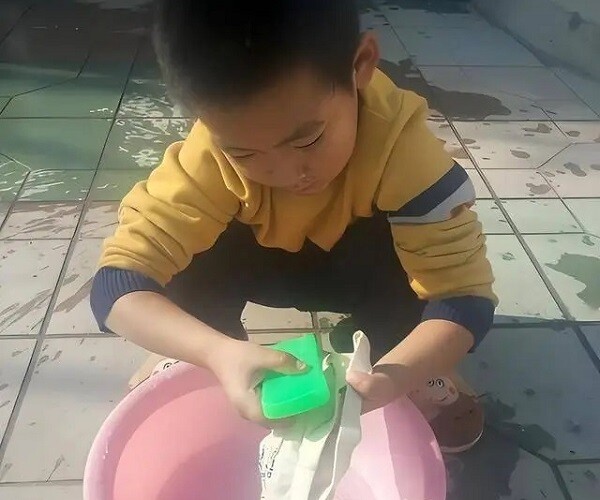A few years ago, on the show “Youth Speak Out” (a popular Chinese TV program), the story of a boy named Fu Xuanrang caused a stir. At the time, the boy “complained” about his mother on the show, saying that she always made him wash pots and pans, do the laundry, including her underwear, and hoped that she wouldn’t make him do as many chores in the future.
In response, his mother frankly said, “No, you will do more in the future. Because household chores and studying are part of life. They not only cultivate your practical abilities but also make you more patient and loving.”

Illustration.
Looking back at Fu Xuanrang’s family, his mother had poor health, so his father took on all the household chores since they got married.
Moreover, his father is very responsible and filial, taking good care of his mother-in-law when she was ill.
Therefore, according to Xuanrang’s parents’ point of view: Teaching their son to do chores from a young age is not abuse but laying the foundation for his future success and family happiness.
This program sparked quite a controversy at the time. Some netizens argued, “The children’s job is to study. They are already tired, and we shouldn’t add more burden.”
Many netizens agreed with the parents’ approach: “This mother has a far-sighted and correct view. The child she raises will definitely have a bright future.”
Indeed, with this reverse education method, Fu Xuanrang received offers from Tsinghua University, Fudan University, and Nanjing University immediately after graduating from high school. His name topped the school’s recommendation list.


Cut from the show.
Involving children in household chores is essential for their growth and development.
Labor can cultivate practicality and organizational skills, enhance responsibility, and promote children’s learning abilities.
Chores develop practical skills and can positively impact logical thinking.
The primary purpose of doing chores is “doing it yourself.”
Child development psychologists conducted an experiment: They recruited two groups of students, one group of children who regularly did chores at home and another group who did not.
The experts asked both groups to clean their backpacks and desks simultaneously. It turned out that each student in the chore-doing group had a specific logic to their cleaning method.
For example, some students arranged books by size, while others sorted them by subject. In summary, regardless of their approach, they kept everything neat and tidy.
The non-chore-doing group seemed a bit lost. Some of them couldn’t seem to find a system. Their brains directed them to do one thing, but their hands couldn’t keep up with the instructions. In the end, their books and stationery were in a mess.

Children who regularly do chores have better organizational skills and concentration.
This ability will extend to all aspects of their studies, lives, and communication. Practicing from small tasks will create a solid foundation for children’s emotional and life skill development.
Therefore, if parents realize this and start with simple household tasks to cultivate their children’s work abilities, it will benefit their overall development. Tasks like clearing the dinner table, folding laundry, or tending to plants teach children how to organize, manage time, and cultivate responsibility and independence.

Children who do chores regularly have better organizational skills and concentration.
Many parents complain: “Today’s children lack gratitude, responsibility, and are becoming more selfish.” This often stems from children not experiencing the realities of life’s challenges.
Experts from Harvard University in the United States discovered that children who are good at doing chores grow up to have a 15% higher employment rate and more stable marriages. This shows that early training significantly impacts their future, from careers to social relationships.
Therefore, if parents realize the importance of doing chores early on, it will help children develop the necessary skills and become responsible, appreciative, and self-reliant adults.

Psychologists advise parents to let their children pack their school bags themselves.
When given this task, children learn to organize their work, from choosing books and stationery to checking if they have packed everything needed.
To some extent, a child’s character is shaped by their parents’ behavior.
Some parents mistakenly believe that children will naturally become independent as they grow up and, therefore, require no intervention.

Psychologists advise letting children pack their school bags.
Others believe that this ability demands a lot of effort to cultivate and guide.
Therefore, depending on the child’s age and physical condition, assign them age-appropriate chores. For example, when children start preschool, teach them simple tasks like wiping tables and putting away toys.
As they grow older, they can take on sweeping, dressing themselves, and packing their school bags. For older children, teach them to cook simple meals.
In summary, cultivate practical skills from a young age, and don’t be afraid to let your children try. Don’t worry if they don’t do it perfectly or make a mess; it’s all part of the learning process.
“4 Behaviors That Indicate Overly ‘Innocent’ Parenting: Protect Your Child From Bullying”
A child who is overly meek may become a target for bullies. It is important for parents to recognize the signs of an overly submissive personality and take steps to empower their child. This may include encouraging them to stand up for themselves, teaching them assertiveness skills, and boosting their self-esteem. By helping their child develop a healthier sense of self-worth, parents can reduce the risk of them becoming a victim of bullying.
“Infographic: 9 Fun and Educational Holiday Activities for Kids”
Parents, are you looking for ways to engage and connect with your children during the weekends or holidays? It’s important to choose the right activities and games that are not only fun but also educational and age-appropriate. As a savvy parent, you understand the significance of quality family time and the impact it can have on your child’s development. By selecting the perfect games, you can create memorable moments and foster a loving and nurturing environment for your little ones.








































